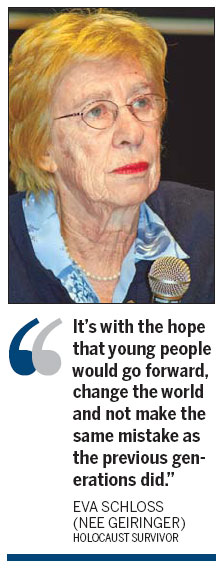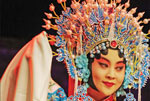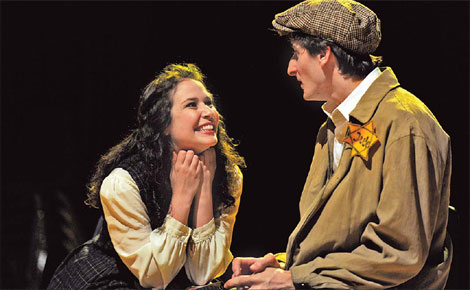Chinese Way
No denying the Holocaust
Updated: 2011-05-10 08:00
By Chitralekha Basu (China Daily)
|
Then They Came for Me is based largely on the accounts of Eva Geiringer, who hid in the same Amsterdam apartment block as Anne Frank. Photos provided to China Daily |
A recent production of Then They Came for Me in Beijing underlines the importance of not forgetting the lessons of history. Chitralekha Basu reports.
Anne Frank, who is the most recognizable face of young victims of the Jewish Holocaust during World War II, is reasonably well known and widely translated in China. Eva Geiringer, who was also hiding from the Nazis in the same apartment block in Amsterdam as Frank, is not so famous.
In late April, a mostly young and multicultural crowd at Beijing's Dulwich College was introduced to the Holocaust experience through the staging of Then They Came for Me, a multimedia production based primarily on Geiringer's (Eva Schloss after marriage) accounts.
Pieced together from Eva's Story, published in 1988, Frank's celebrated diary and footage of interviews with Eva, and Ed Silverberg, a fellow Jewish teenager in hiding with whom Frank shared the first stirrings of romance, Then They Came for Me recreates the Holocaust, as experienced by four young people (including Eva's softly spoken and musically inclined brother Heinz).
The high point of the show was Eva's presence in the audience.
Since 2000, when the play was first produced by London-based social activist Nic Careem, Eva has taken questions from the audience following the show.
Eleven years on and 700 shows later, the 81-year-old seems just as eager to field queries about the nightmare she lived through and inspire young people to prevent such genocides from happening again.
"I have spent the last 20 years educating the younger generation about the horrors of the Holocaust," Eva says. "It's with the hope that young people would go forward, change the world and not make the same mistake as the previous generations did."
Bringing the play to China is particularly meaningful for Eva, as she remembers with gratitude how thousands of Jewish people from Europe found asylum in Shanghai, mainly through the kind offices of He Fengshan, a Chinese diplomat in Austria.
"I have met some of these people who came to China when the rest of the world had closed their doors on the Jewish community, and they told me how they could make a life here all over again," she says.
China was the first stop on the play's Asian itinerary. Then They Came For Me had successful runs in Europe and the United States, including shows in the Scottish, British and European parliaments and featured over 100 actors, including Muslims, blacks and Israelis. It will soon play in India.
The five-member cast, who between them played 11 characters, were an energetic bunch, culled from across the US, United Kingdom, Australia and China, united in their commitment toward the project.
 |
Yellow-haired Kevin Jarvis, from the UK, switched convincingly from playing a middle-aged Jewish man on the run to a ruthless Gestapo officer beating up Eva in captivity, to a young recruit in Hitler's SS cadet team.
Claire Rigsby, from Atlanta, who played the chirpy, individualistic Frank, as well as Eva's harried mother, Mutti, broke down while talking about the anguish and the honor that playing such characters has brought in their wake.
The China angle in the cast is James Kong (see sidebar), the 79th direct descendent of the Chinese philosopher, ideologue and political thinker, Confucius. His casting in the play was a happy accident.
Once, after a show, in the UK, director-producer Nic Careem got talking about the legendary "hate-busters" of the world. The list kept growing: Christ, Buddha, Nelson Mandela, Mahatma Gandhi. Kong's British mother Jeni, who was in the audience, piped up "Confucius". It soon transpired she had a son with a Confucius connection who happened to be an actor. Careem was keen to bring the play to China. He auditioned Kong for the part of Heinz, and found he fit the role to a T.
"James (Kong) is the same age as Heinz was when he went through the events shown in the play. He has a similar musical talent and a mature sense of commitment to the project," Careem says.
Kong is slightly overwhelmed by "the responsibility of making Eva proud of her brother". He is heavily invested in breathing life into the artistic and sensitive young man "who was cut down in the prime of his life". After his first performance, Eva told him he was "perfect".
Both Frank and Eva's families were turned in by people they had trusted and were taken to concentration camps in May 1944.
Frank did not live to tell her story. Eva did and renewed her bond with Frank long afterwards when her mother, Fritzi, married Frank's father, Otto, in 1953, a year after Frank's diary was published, inspiring a huge following across the English-speaking world. Frank died at 15. Eva, now her stepsister, feels grateful "for having the opportunity to take her story to the people who understand suffering and respond to it".
Taking Frank's, and indeed her own, story to the world has won Eva a series of awards from several US state governments, as well as Latvia, Australia, Argentina and Brazil.
But the greatest recognition, she says, is to meet "10-year-olds full of questions, trying to grasp the situation (in history)".
It proves that the story of human survival against the greatest odds is understood the world over, she says.
Specials

The song dynasty
There are MORE THAN 300 types of Chinese operas but two POPULAR varieties are major standouts

Sino-US Dialogue
China and the US hold the third round of the Strategic and Economic Dialogue from May 9-10 in Washington.

Building communities
American architect John Portman and his company have developed more than 30 projects across China.
